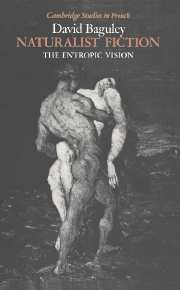Book contents
- Frontmatter
- Contents
- Acknowledgments
- Introduction
- 1 Histories
- 2 Theories: realism, naturalism, genre
- 3 The founding texts
- 4 The tragic model
- 5 Comic strains
- 6 In the ironic modes: naturalist satire and parody
- 7 The ‘scandal’ of naturalism
- 8 Naturalist description
- 9 The entropic vision
- 10 By way of conclusion: two English examples
- Notes
- Translations of passages in French
- Select bibliography
- Index
- Cambridge Studies in French
- Frontmatter
- Contents
- Acknowledgments
- Introduction
- 1 Histories
- 2 Theories: realism, naturalism, genre
- 3 The founding texts
- 4 The tragic model
- 5 Comic strains
- 6 In the ironic modes: naturalist satire and parody
- 7 The ‘scandal’ of naturalism
- 8 Naturalist description
- 9 The entropic vision
- 10 By way of conclusion: two English examples
- Notes
- Translations of passages in French
- Select bibliography
- Index
- Cambridge Studies in French
Summary
The use of one of the most bandied about and abused of terms, both in literary criticism and everyday life, to apply to a group of (mainly) late nineteenth-century (mainly) fictional texts clearly requires preliminary justification. As George Moore's article on L ' Education sentimentale suggests, contemporary writers and critics were by no means loath to employ the term and to propose that the naturalist novel represented a new form of the tragic genre. The English ‘naturalists’ appear to have been particularly inclined to apply the term, even to the most mundane of misfortunes. In A Drama in Muslin, for example, George Moore's narrator even claims that, ‘seen from afar, all things are of equal worth; and the nearest things, when viewed with the eyes of God, are raised to those heights of tragic awe which conventionality would limit to the death of kings or patriots’. Arnold Bennett had a particular fondness for the term, writing, for instance, in The Old Wives' Tale (1908), of the ‘tragedy of Sophia's life’ and of the ‘ineffable tragedy’ of her sister's fate, even writing in the same novel that the ‘clumsiness of children is sometimes tragic’ or that Sophia's husband has nothing to show after four years of marriage but ‘an enfeebled digestion and a tragic figure of a wife’. One suspects that, in such cases, the unfortunate term is being more ill-used than the unhappy characters. Hardy, as is well known, had a loftier view of tragedy, believed that the tragic spirit was very much in tune with modern times and sought to depict the desperate ‘collision between the individual and the general’ in the lives of humble folk.
- Type
- Chapter
- Information
- Naturalist FictionThe Entropic Vision, pp. 97 - 119Publisher: Cambridge University PressPrint publication year: 1990

